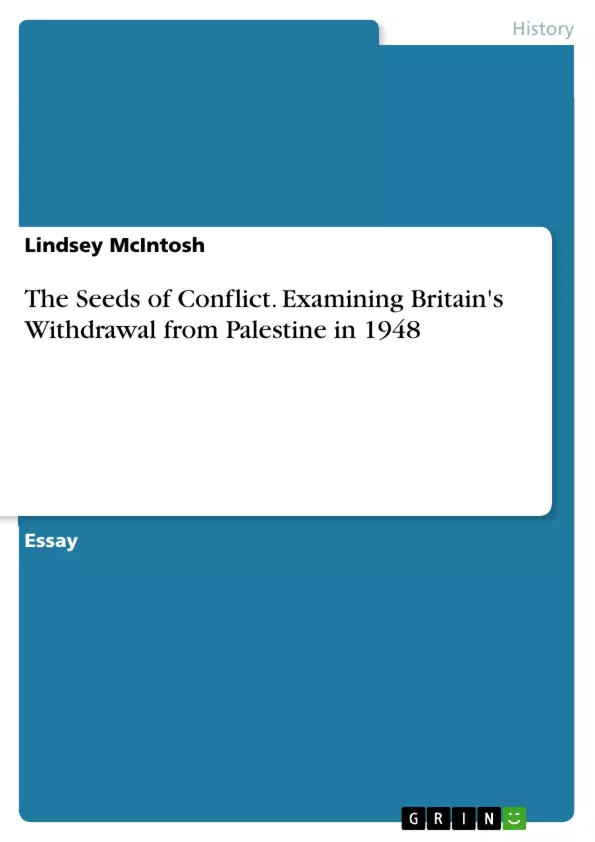The inter- and post-war years in Palestine occupied some of the most turbulent decades of conflict in the history of the Middle East. Following the dissolution of the Ottoman Empire at the end of the First World War, the League of Nations entrusted the mandated territory of Palestine to the United Kingdom at the San Remo Conference of 1920. For twenty-eight years, responsibility for the Palestinian people and their land would fall subject to British control.
However, this penetration of western control would bring a de-stabilizing effect upon the land and a multitude of factors later intertwined to cause dissipation of the mandate. The decision to withdraw from Palestine was officially reached on the November 29th, 1947 by a two-thirds majority vote at the United Nations General Assembly. However, despite discussions for this retreat taking place months prior, its execution would by no means form a simple process. Rather, the repercussions of this decision led not only to the Arab-Israeli War in 1948, but also dramatically altered the demographic landscape of Palestine itself.
The ambition of this essay will not be to identify a single ‘supreme’ factor which influenced the British to relinquish control of the mandate. Nor will it attempt to cover every element that contributed towards the decision for partition, as to do so would both dilute and complicate the study of the essay. However, it will propose to examine several integral factors of both short- and long-term positions in order to develop a clearer understanding of what lead to Britain’s decision to withdraw from Palestine on May 14th 1948 and the repercussions cast behind the creation of Israel.
Inhaltsverzeichnis (Table of Contents)
- The inter- and post-war years in Palestine
- The decision to withdraw
- The volatile situation within Palestine
- With the seeds of conflict sown
- One of the most spectacular attacks carried forth by the Irgun
Zielsetzung und Themenschwerpunkte (Objectives and Key Themes)
This essay will explore the contributing factors that led to Britain's decision to withdraw from Palestine in 1948 and the repercussions of that decision. The essay will focus on both short- and long-term factors, in order to develop a clear understanding of the complex events that led to the creation of Israel.
- Conflicting promises made to Arabs and Zionists by Britain
- The rise of Jewish para-military groups and their actions against British authorities
- The impact of terrorist attacks, particularly the King David Hotel bombing
- The erosion of British public support for the mandate
- The role of British resources and the aftermath of World War II
Zusammenfassung der Kapitel (Chapter Summaries)
- The inter- and post-war years in Palestine: This section introduces the context of Britain's involvement in Palestine after World War I, highlighting the instability caused by British control and the conflicting promises made to both Arabs and Zionists. It outlines the historical backdrop of the conflict that would later develop.
- The decision to withdraw: This chapter examines the circumstances leading to Britain's decision to withdraw from Palestine, emphasizing the United Nations General Assembly's vote in 1947 and the complex ramifications that followed.
- The volatile situation within Palestine: This section focuses on the hostile atmosphere between Arabs and Jews, fueled by conflicting promises and the burgeoning Zionist movement. It explains how the seeds of conflict were sown during the early decades of the 20th century.
- With the seeds of conflict sown: This chapter explores the escalation of violence in Palestine during the 1940s, outlining the emergence of Jewish para-military groups and their actions against British authorities. It details how the growing tension made the British presence increasingly difficult and contributed to their decision to withdraw.
- One of the most spectacular attacks carried forth by the Irgun: This section delves into the King David Hotel bombing, highlighting its significance in shaping British public opinion and exacerbating anti-Semitic sentiment. It examines the motivations behind the attack and its far-reaching impact.
Schlüsselwörter (Keywords)
Key themes and concepts explored in the text include: British Mandate, Arab-Israeli conflict, Zionist movement, Jewish para-military groups, terrorism, King David Hotel bombing, British public opinion, post-World War II environment, and the creation of Israel.
Frequently Asked Questions
Why did Britain decide to withdraw from Palestine in 1948?
The decision was influenced by multiple factors, including conflicting promises to Arabs and Zionists, the rise of Jewish para-military groups, and the erosion of British public support after World War II.
What was the impact of the King David Hotel bombing?
Carried out by the Irgun, the bombing significantly shaped British public opinion against the mandate and highlighted the increasingly volatile security situation.
How did the United Nations influence the withdrawal?
On November 29th, 1947, the UN General Assembly voted for a partition plan, which provided the official framework for the British retreat.
What role did Jewish para-military groups play?
Groups like the Irgun engaged in actions against British authorities, making the continued occupation costly and difficult for the post-war UK government.
What were the long-term repercussions of the British withdrawal?
The withdrawal led directly to the 1948 Arab-Israeli War and dramatically altered the demographic and political landscape of the region, resulting in the creation of Israel.
- Quote paper
- Lindsey McIntosh (Author), 2014, The Seeds of Conflict. Examining Britain's Withdrawal from Palestine in 1948, Munich, GRIN Verlag, https://www.grin.com/document/366418



